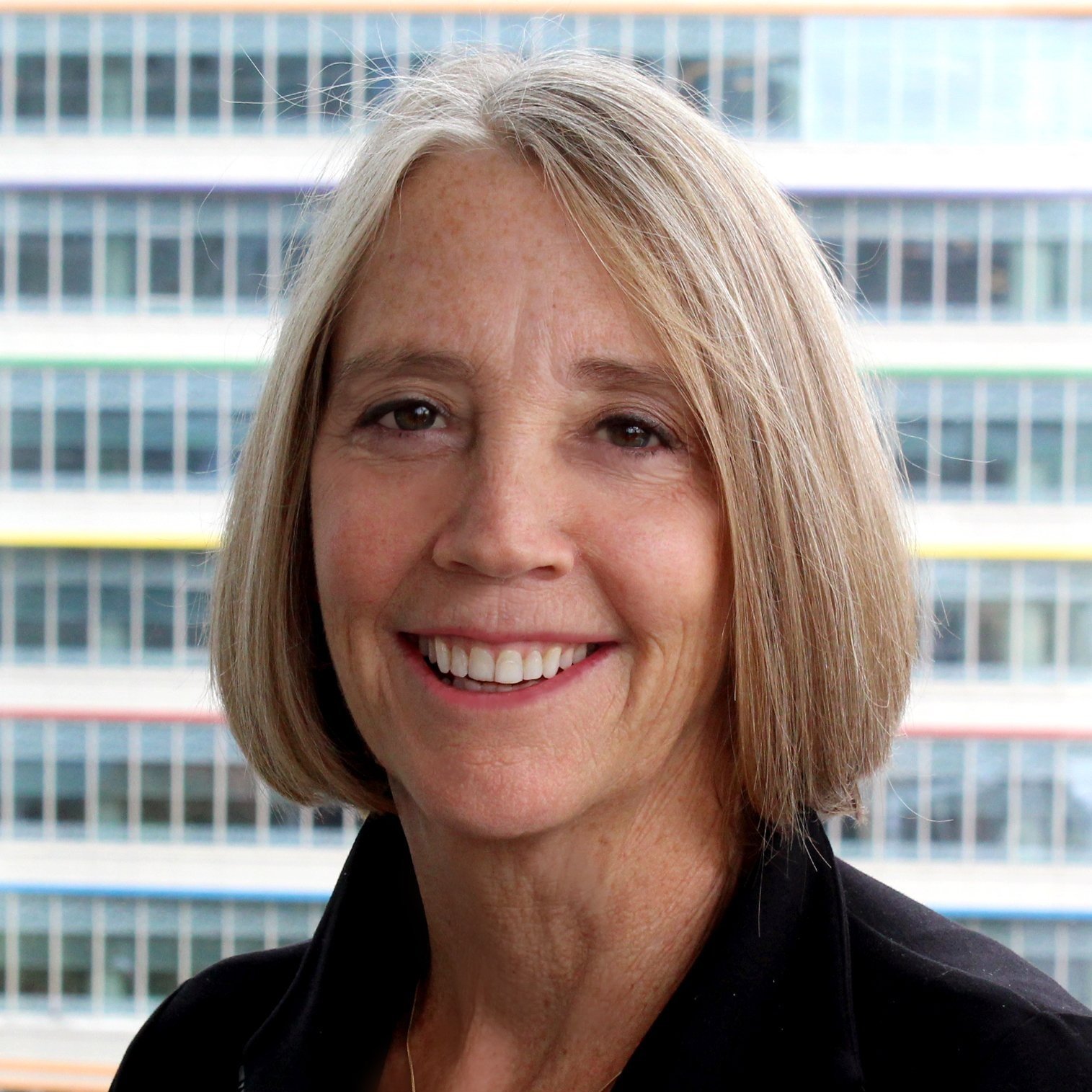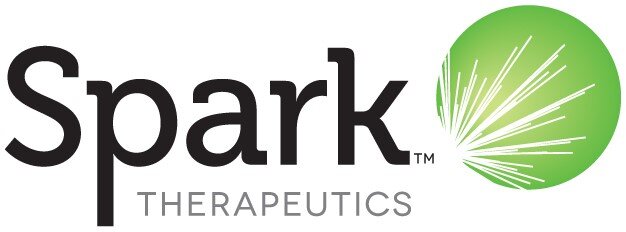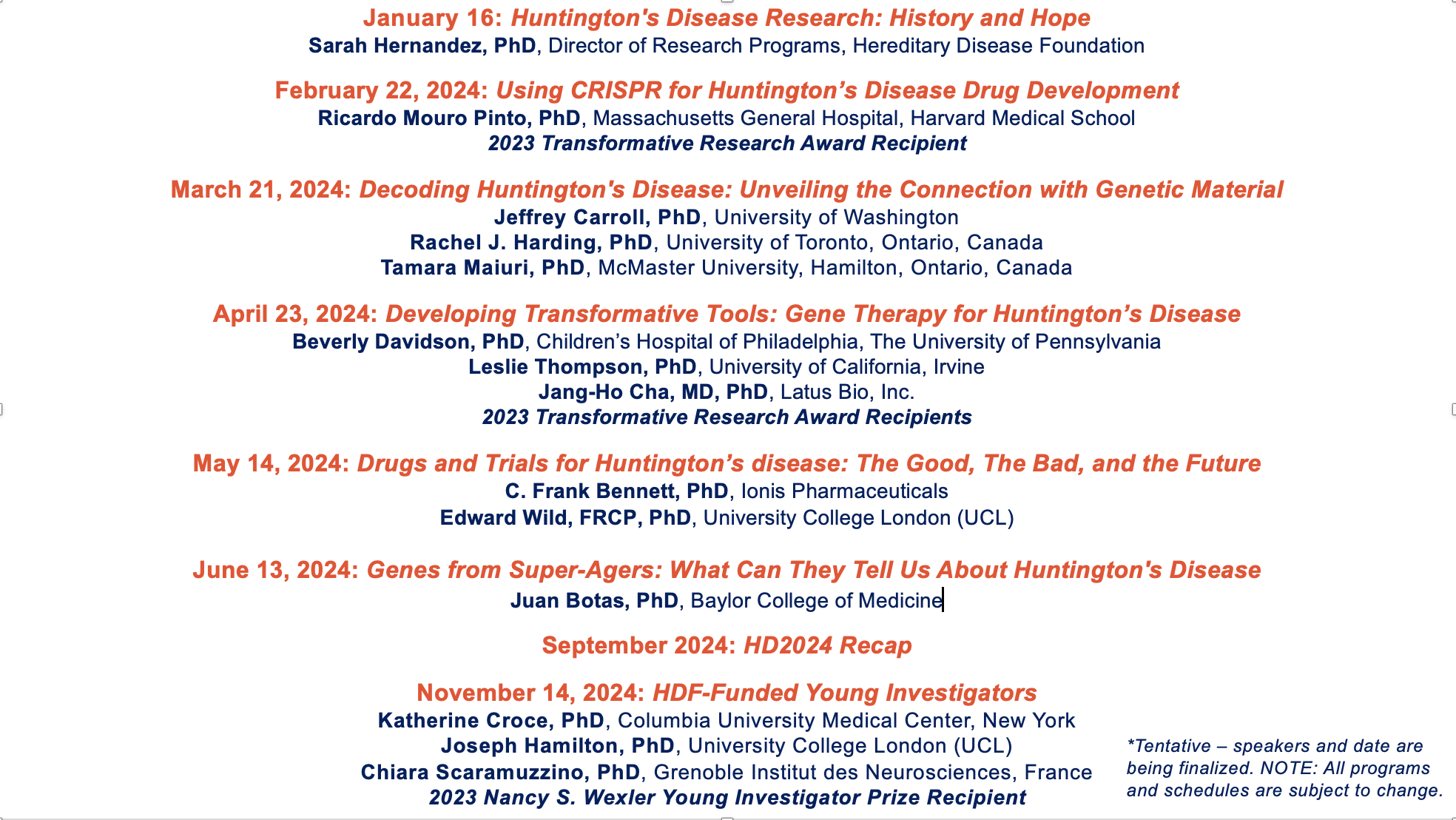The Hereditary Disease Foundation Research Spotlight Webinar series features brilliant scientists working to identify treatments and cures for Huntington's disease and other brain disorders. This Webinar series is designed for the general public. Scientists will discuss their work in non-technical language. Hereditary Disease Foundation webinars are open to all free of charge.
See full lineup for our 2024 Research Spotlight Webinars
Watch HDF’s Director of Research Programs Sarah Hernandez’s Huntington's Disease Research: History and Hope webinar anytime.
Join us on Tuesday May 14, 2024 for our Research Spotlight Webinar, “Drugs and Trials for Huntington’s Disease: The Good, The Bad, and The Future” featuring C. Frank Bennett and Ed Wild
About the Speakers
C. Frank Bennett, PhD
Ionis Pharmaceuticals
2019 Breakthrough Prize in Life Sciences
Dr. C. Frank Bennett is one of the founding members of Ionis Pharmaceuticals, leading much of their preclinical antisense drug discovery and antisense technology research. He has been involved in the development of antisense oligonucleotides as therapeutic agents, including research on the application of oligonucleotides for inflammatory, neurodegenerative diseases and cancer, oligonucleotide delivery, pharmacokinetics and medicinal chemistry. He has published more than 230 papers in the field of antisense research and development and has more than 175 issued US patents. Dr. Bennett collaborated with Adrian Krainer, of Cold Spring Harbor Laboratory, to develop Spinraza, the first effective therapy for spinal muscular atrophy (SMA), a progressive neurodegenerative disease and the number one genetic cause of death for infants. Dr. Bennett received HDF’s 2018 Leslie Gehry Brenner Prize for Innovation in Science.
Edward Wild, PhD, FRCP
University College London, United Kingdom
Dr. Ed Wild is a Professor of Neurology at University College London, a Consultant Neurologist at the National Hospital for Neurology and Neurosurgery in London’s Queen Square, and Associate Director of UCL Huntington’s Disease Centre. He leads a team of researchers aiming to accelerate the development of new therapies to make a real difference for people impacted by Huntington’s disease. He gave the first injection of tominersen in 2015 and has been involved in the design and running of numerous HD clinical trials. He co-founded HDBuzz in 2010.
Thank you to our sponsors!
Join us on Thursday, June 13, 2024 for our Research Spotlight Webinar, “Genes from Super-Agers: What Can They Tell Us About Huntington’s Disease?” with Juan Botas
About the Speaker
Juan Botas, PhD
Professor, Molecular and Human Genetics
Professor, Molecular & Cellular Biology
Baylor College of Medicine
Over the past several decades, many genes triggering neurological diseases have been identified. Some of these diseases are caused by gain of function mutations and/or impaired proteolysis of the respective proteins. Among these proteins are huntingtin (Huntington disease, HD), alpha-synuclein (Parkinson's disease, PD) and the tau and amyloid precursor proteins (in Alzheimer's disease, AD). On the other hand, diseases like Rett Syndrome are caused by loss of function mechanisms. Despite many significant advances, we still have a poor understanding of what happens between the triggering of the disease by the faulty protein and the ultimate death of the neuron. What are the molecular mechanisms and gene networks driving pathogenesis? What mechanisms are deployed by neuron and glia to compensate CNS dysfunction? Can we identify therapeutic targets common to more than one disease?
To address these questions, Dr. Botas integrates computational and wet-lab approaches using a combination of experimental model systems including Drosophila (fruit fly) and mice, as well as neuronal primary cultures and iPSC-derived human neurons. He has generated Drosophila models for many neurological and neuromuscular disorders that recapitulate key neuropathological phenotypes observed in patients. Drosophila models for the neurodegenerative diseases spinocerebellar ataxia type 1 (SCA1), Huntington’s, Parkinson’s, and Alzheimer’s show late onset, progressive neuronal degeneration and disease-specific neuropathology. He uses these Drosophila models as a discovery tool: together with state-of-the-art robotic instrumentation, they allow him to carry out high-throughput, genome-wide genetic screens to identify genetic modifiers and therapeutic targets.
Thank you to our sponsor!
Watch our April 2024 Research Spotlight Webinar, “Developing Transformative Tools: Gene Therapy for Huntington's Disease” featuring 2023 Transformative Research Award recipients Beverly Davison, Leslie Thompson, and Jang-Ho Cha
About the Speakers
Beverly L. Davidson, PhD, Principal Investigator
Children’s Hospital of Philadelphia
University of Pennsylvania
Beverly Davidson’s laboratory focuses on genetic diseases that affect the brain, investigating how mutant gene products contribute to disease, and why certain brain regions are more susceptible than others. Her team employs advanced molecular methods, sequencing and imaging in animal models, and a variety of molecular tools to test various hypotheses. Her lab is also developing next generation therapeutics for inherited disorders, including the engineering of novel gene therapy vector capsids and cargo to approach tissue and cell type specific treatments. Recent honors include the 2023 National Ataxia Foundation’s Dr. John W. Schut Research Achievement Award. She is immediate past president of the American Society of Gene and Cell Therapy, the largest international association of gene and cell therapy research. She is an elected member of both the American Academy of Arts Sciences and the National Academy of Medicine. Dr. Davidson received the HDF’s Leslie Gehry Brenner Prize for Innovation in Science in 2015.
Leslie M. Thompson, PhD, Co-Investigator
University of California, Irvine
Dr. Leslie Thompson has studied Huntington’s disease for most of her scientific career. She was a member of the the HDF’s Venezuela Project that identified the causative gene for HD in 1993. She is trying to understand how the HD mutation damages brain cells and identify targets for new drugs to prevent or ameliorate the damage. She is also looking at how the mutation influences modifications of the huntingtin protein and other cellular molecules. In addition, Dr. Thompson worked with a group of investigators to establish the HD patient-derived iPS cell consortium (induced pluripotent stem cells) and is using stem cells to study HD through multi-institutional collaborations and Big Data approaches. She is currently evaluating the use of human neural stem cells as a possible therapy for HD. Dr. Thompson is an American Association for the Advancement of Science fellow. She received the HDF’s Leslie Gehry Brenner Prize for Innovation in Science in 2013.
Jang-Ho J. Cha, MD, PhD, Co-Investigator
Latus Bio, Inc.
Jang-Cha is the Chief Scientific Officer, Latus Bio, Inc. Previously, he was the Global Head of Translational Medicine, Neuroscience at Novartis. He obtained his MD and PhD from the University of Michigan and did his residence in neurology at Massachusetts General Hospital in Boston, MA. During his career at Massachusetts General Hospital, Dr. Cha held multiple positions culminating in Associate Professor of Neurology.
Thank you to our sponsors!
Full 2024 webinar lineup
Through your tax-deductible donations to the Hereditary Disease Foundation, we can accelerate urgently needed research breakthroughs.














